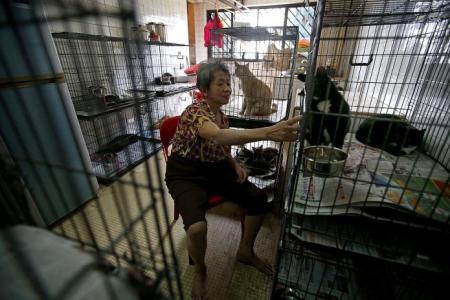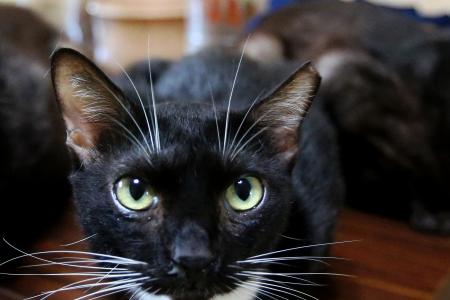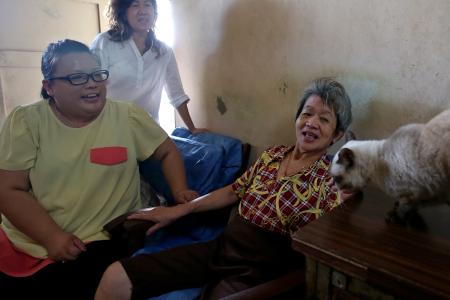Woman with 20 cats gets help in cleaning cockroach-infested flat
Injured 'cat lady' with 20 cats at home receives help in cleaning cockroach-infested flat after fall renders her immobile
She was dubbed the neighbourhood's cat lady by residents who saw her feeding strays regularly.
But after a bad fall in November, which rendered her immobile, Madam Koh Poh Choo was unable to take care of herself - and her 20 cats.
Last week, the Cat Welfare Society (CWS) highlighted the state of Madam Koh's kitchen in a video posted on its Facebook page.
Cockroaches were seen darting around and crawling about the cages the cats are kept in at her Jurong East flat.
The video, which has had more than 42,000 views, received a mixed response from netizens.
Some users said the 63-year-old was torturing the cats by keeping them in dirty cages. Others praised her good intentions.
Madam Koh told The New Paper in Mandarin: "After I fell, I couldn't walk and clean the cat cages. That's when the cockroaches started swarming in from the rubbish chute."

The infestation was also an issue for her neighbour two doors away, Madam Angeline Lee, 42.
The landscaping coordinator said: "I know she keeps a lot of cats in her house and I've became used to the odour.
"But it was worrying when the odour from her house started to get stronger over the last few months."
Madam Koh started bringing home stray cats more than 10 years ago after she saw them being caught to be culled.
DETERIORATING HEALTH
"I tried to stop them from catching the cats, but they (the authorities) turned me away," she said.
"I feel sad when I see them roaming around without food. That's why I bring them home - so I can feed them."
All of Madam Koh's cats were sterilised two years ago, after a CWS volunteer she befriended from cat feeding over the years found out that she had 20 cats at home.
Her current problems started only after she became immobile.
Madam Koh's 36-year-old son, who is intellectually disabled, left his job as a shop assistant to be her primary caregiver after her health deteriorated due to diabetes and high blood pressure.
Madam Koh's husband, a collector in a recycling company, became the sole breadwinner.
She said: "Even though we have to scrimp and save, there's always enough money to feed the cats. Their food is very cheap, only 10 dollars a week."

She admitted that it took her son quite a while to adapt to his new responsibility after leaving his job.
"He had to take care of me and my cats and he was not used to cleaning after them. That's why there were a lot of cockroaches," she said.
Madam Koh said that when the number of cockroaches got out of hand, they tried spraying insect repellent around the kitchen three times a day, but it was no use.
After CWS was alerted last month, a group of volunteers stepped in to help clean Madam Koh's flat.
After discarding unused items and old cages, CWS bought Madam Koh 11 new cages from donations the society received from members of the public.
Some even provided flea treatment and food for the cats.
"If possible, I want to raise my cats until they die, but if people are willing to adopt them, I'll let them go," said Madam Koh.
A Ministry of Social and Family Development spokesman said it is working with various agencies in the community to reach out to and assist Madam Koh.
"Madam Koh has declined applying for assistance at the Social Service Office (SSO) at Jurong East and shared that her family is able to cope financially," said the spokesman.
"She has also been informed to approach SSO in the future if she needs help."
CWS chief executive officer Pauline Leow said: "Out of the 10 cases of such families that we handled this year alone, there are more than 200 cats in these homes combined.
"It is simply impossible to find a place for them and that's why we depend on members of the public to come forward and adopt."
She added: "Now her son knows how to take care of the cats and since he's been cleaning after them twice a day, the condition has improved drastically."
When TNP visited Madam Koh's flat last week, her flat was clean and there were about 20 cats.
The less aggressive cats roamed around freely, while others slept in their new cages.
Madam Koh is grateful for all the help given to her.
"The house is now very comfortable. I like it and I'm sure my cats like it, too. We will try to keep it this way," she said.
When asked if she named the cats, she said: "There are too many of them so I call all of them mao mao (cat in Mandarin). They are like my children and I love them all equally."
"I feel sad when I see them roaming around without food. That's why I bring them home - so I can feed them."
- Madam Koh Poh Choo
Animal hoarding can be a 'mental disorder'
Accumulation of a large number of animals, inadequate care for them and failure to recognise the harms and sufferings caused to the animals is considered hoarding, said psychiatrists.
Hoarding is not a bad habit, but a mental disorder, said Dr Lim Boon Leng, a psychiatrist in private practice.
"Patients usually hoard whatever that is of value to them," he said.
"That's why they often feel the need to keep unwanted things because they have the erroneous view that these things will be important."
Consultant psychiatrist and medical director at Novena Medical Centre, Dr Thomas Lee, agreed.
"Animal hoarders develop a deep attachment to the animals in their care. While the hoarders continue to take in or 'save' more animals, they find it very difficult to let go of them," he said.
Dr Lee also urge family members of hoarders to get a mental health assessment so that appropriate treatment can be rendered.
He added: "Although it can be frustrating to be living with an animal hoarder, family should minimise confrontations because in doing so, the hoarder can become defensive and refuse help."
Get The New Paper on your phone with the free TNP app. Download from the Apple App Store or Google Play Store now




